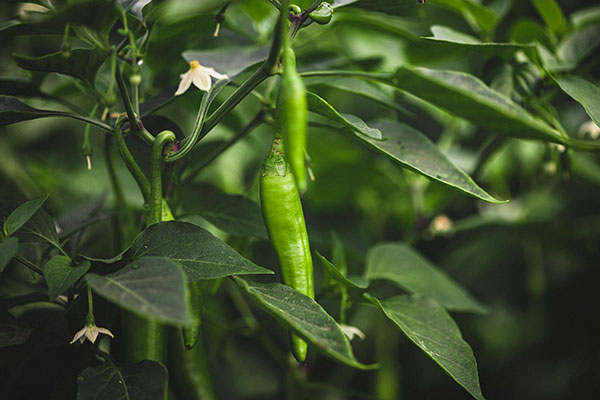“It’s almost like we know what we’re doing!” My team and I here at Norton Farm often say this with a wry smile after a day’s work. We’re a small operation compared to Riverford’s Devon farm; only four acres, specialising in fresh herbs and salad vegetables. We grow organic Butterhead lettuces, coriander, flat parsley, chillies, and so on. In a year, we turn out over 150,000 bags of herbs, 2000kg of chillies, and 20,000 lettuces, mostly grown in just half an acre of polytunnels.
I’ve been in organic farming for over 25 years (12 at Riverford), and my colleagues Samantha and Samantha have both worked here for over four years – so we’ve all had our share of good and bad days. Even with our collective years of experience, we still get caught out, and a crop that we planted and raised successfully last year might struggle the next.
Chillies were a tricky crop for us in this past year, and we got a much lower yield than usual. Varieties we usually use weren’t available due to a tomato virus that also affects chilli plants, and the alternatives we chose just didn’t grow as well. The inconsistent weather last year also meant slow ripening of the chilli fruits, and although many varieties can be picked green, most benefit from the sun fully ripening them for the best flavour. Flat parsley, on the other hand, seemed to enjoy the variable weather, and we had a bumper crop.

I think a lot of growers will agree that sometimes, after planting or sowing a crop, it feels as if what yield and quality you’ll get is in the lap of the gods. That’s not to say that the years of experience and local knowledge don’t count for anything; we do everything possible to give the crop the best chances, managing water, soil, and the risks of pests or diseases carefully.
But as much as we can plan, there’s always the possibility of some unknown factor throwing you off – extreme weather, mechanical failures, a global pandemic, or political stupidity leading to labour shortages. But farmers keep on going, adapt every day, and by the end of the year if you’ve hit most of your targets, paid all the wages and bills, and maybe (just maybe) shown a tiny bit of a profit, that’s when you can sit back, take a deep breath, and say “It’s almost like we know what we’re doing!” Before jumping back on the tractor to start all over again.













0 Comments